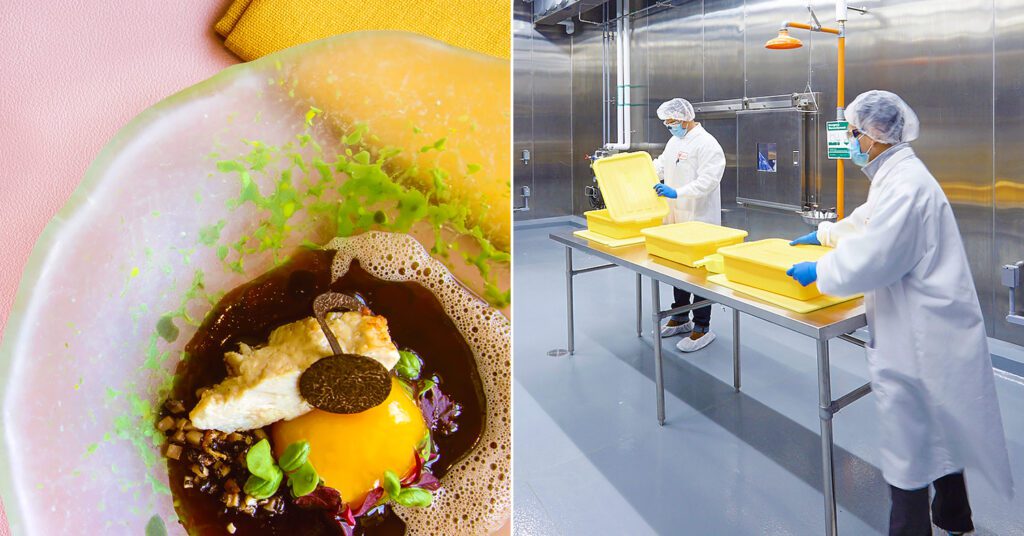Investments in alternative protein continue to be more popular than ever before. But, the venture capital world is turning its attention to two areas in particular: fermentation, and cultivated meat and seafood.
These findings came from the Good Food Institute’s (GFI) latest report, which revealed a record $5 billion invested in alternative proteins overall in 2021, a 60 percent increase from last year. For years now, investors have been paying close attention to the companies that are making and developing products that can disrupt conventional animal products like meat, seafood, dairy, and eggs.
While motivations for investing may vary, sustainability is often part of the conversation. Industrial animal agriculture, otherwise known as factory farming, is driving climate change. And, as the most recent IPCC report on the impact of climate change pointed out, the food industry needs a hard pivot into something that the planet can actually sustain for generations to come.
Alternatives are part of the answer, making the category an alluring portfolio addition to VC firms and angel investors who are looking to make money while keeping the planet’s best interests in mind. Plant-based foods, which includes products from companies like Impossible Foods and AI-powered startup NotCo, secured $1.9 billion in investments last year, a decrease from 2020’s $2.1 billion. This doesn’t mean that interest in the market is falling—it’s still going quite strong. But, the report reveals that new technologies are courting the VC world.

Fermentation and cultivated meat take the lead
Notably, fermentation companies dedicated to animal product analogs and cultivated meat and seafood both saw about three times as many investments, respectively. But, why? It’s not that plant-based food is suddenly falling out of favor.
“Investors are naturally diversifying their portfolios by investing in fermentation and cultivated meat and seafood companies as these segments of the industry mature,” says Sharyn Murray, senior investor engagement specialist at GFI, adding that as the plant-based market begins to mature, several later-stage companies are undergoing liquidity events—like Oatly’s $1.4 billion IPO or Brazilian meat giant JBS’s acquisition of Dutch plant-based meat brand, Vivera.
Fermentation and cultivated meat are both burgeoning industries that investors want a piece of while they’re still on the precipice of coming to the market. And, these industries are working on more than just products that consumers will be able to buy at a restaurant, or in a store.
More investors are tuning into technologies that can be used to improve plant-based products. For example, Motif FoodWorks uses precision fermentation to make Hemami, a yeast-derived, iron-rich protein that makes meat taste meatier. (It’s also developed technology that helps dairy-free cheese stretch and melt.) Several cultivated meat companies are also in the ingredients game, like Mission Barns, which is developing fat made with animal cells that, when incorporated into a next-generation veggie burger, will arguably not melt into an oily mess.
Though fermentation is thousands of years old, precision fermentation is showing huge promise in its early stages. “Researchers today are exploring how the extraordinary diversity of microorganisms and the target proteins and other molecules they can produce can reshape the future of food,” says Emma Ignaszewski, corporate engagement manager at GFI.

The race to get to market
So far, there are a handful of products made using precision fermentation available to consumers.
There’s the aforementioned Perfect Day protein, and Nature’s Fynd, which makes vegan meat and dairy-free cheese using microbes found in Yellowstone National Park. These products occupy a small market share, but investments will give these companies access to critical areas, like research and development, along with scaling up existing products to make them more affordable and accessible. These changes spurred by investments will arguably help the companies compete better with conventional animal products, and as a result, we can likely expect to see more products hit the market this year.
So far, only one country in the world has granted regulatory approval to the sale of cultivated meat: Singapore. In December 2020, the nation approved the sale of chicken made by GOOD Meat, the cultivated meat arm of Eat Just, the food tech company known for the Just Egg.
But, the US may be getting closer to approval. Last year, the United States Department of Agriculture sought out public comments on what cultivated meat should be named. And, companies are taking technology out of the lab and to the public. GOOD Meat, which is currently working with regulators to obtain approval, says that it cannot comment on the specifics, but it is “pleased with how things are going.”

Wildtype, which makes sushi-grade cultivated salmon, opened a pilot plant in San Francisco last year that people can actually tour. So did Upside Foods, formerly known as Memphis Meats, which makes cultivated chicken. (The company recently announced that its Emeryville, California-based plant is now open for tours.) Israeli startup Future Meat Technologies opened up a pilot facility on its home turf, but is looking to bring its slaughter-free meat to American diners this year.
Cultivated meat producers still face several challenges, but consumer appeal is a big one. Both Upside Foods and Wildtype hope to demystify how cultivated meat is made by opening up their pilot facilities to the public. “In order for cultivated meat to have a positive impact on the world, consumers need to understand it and embrace it,” says Uma Valeti, CEO and founder of UPSIDE Foods.
Another strategy that cultivated meat companies appear to be taking looks very similar to how Impossible Foods introduced the public to the Impossible Burger back in 2016: start small, but impactful, and work your way up. When the Impossible Burger made its debut, it was only available at one venue: Chef David Chang’s Momofuku Nishi in NYC. But now, it’s everywhere.
At the moment, GOOD Meat is the best example of the ways in which cultivated meat can hit the market: it began serving its cultivated chicken in high-end Singapore restaurants and then moved on to home delivery. Most recently, it was served at the historical Loo’s Hainanese Curry Rice hawker stall in Tiong Bahru, replacing conventional chicken in a dish that’s been served for 76 years. The company recently partnered with Michelin-starred chef and philanthropist José Andrés, who will serve GOOD Meat cultivated chicken at one of his US restaurants once regulatory approvals allow. Upside Foods has also tapped into the influential power of chefs: it is working with Michelin-starred chef Dominique Crenn, who has agreed to serve their cultivated chicken once regulatory approvals go through in the US. Now, it’s all a matter of waiting.


